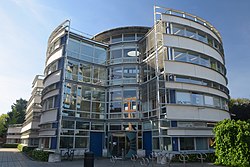Faculty of Divinity, University of Cambridge
Divinity school of the University of Cambridge From Wikipedia, the free encyclopedia
Divinity school of the University of Cambridge From Wikipedia, the free encyclopedia
The Cambridge Faculty of Divinity is the divinity school of the University of Cambridge. It houses the Faculty Library.
 Faculty of Divinity building on the Sidgwick Site | |
| Type | Divinity |
|---|---|
Parent institution | University of Cambridge |
| Location | , , 52.2019°N 0.1080°E |
| Website | www |

Divinity has been taught in the University of Cambridge since its foundation, in the early 13th century,[1] around the time the university itself was founded.[2] It is one of only two subjects to have been taught continuously, in some form or other, throughout the entire 800-year history of the university.[3][better source needed]
The first professorship instituted at the university, the Lady Margaret's Professor of Divinity, was dedicated to the subject, in 1502. Similarly, the next professorships to be established at the university – the Regius chairs, of 1540 – included the Regius Professor of Divinity.
Beginning in 1879, the Faculty of Divinity was housed in the Selwyn Divinity School, constructed by Basil Champneys. Now known as The Old Divinity School, the building belongs to St John's College.[4] Since 2001, the Faculty has been situated on the university's Sidgwick Site,[5] in the west of the city.[6]
Since the 16th century, the University of Cambridge has seen the institution of numerous professorships in different subject areas, beginning with divinity, civil law, physics, Hebrew, and Greek.
The established chairs in the Faculty of Divinity include the following:
The Faculty of Divinity is part of the Cambridge Theological Federation, offering academic training not only to the university's own graduates but also to ordinands as well.[7] The current undergraduate degree is called "Theological and Religious Studies," rather than divinity, which reflects the range of topics and diversification in the field covered by the teaching.[8]
Thematic and disciplinary areas of teaching and research in the Faculty of Divinity:[9]
Since 1820, the Faculty of Divinity has hosted named lectures. They include the following:
For centuries the Faculty of Divinity at Cambridge, like the Faculty of Theology and Religion at the University of Oxford, has been prominent in theological studies not only in the United Kingdom but also across the globe.
As university rankings have increased in importance for higher education in recent decades, the Faculty of Divinity has also maintained a high international profile in this new metric system. In 2019, the QS World University Rankings placed the University of Cambridge as 6th worldwide.[10] Nationally, the Faculty has been ranked 1st by the Complete University Guide (2018)[11] and by The Guardian (2018).[12]
The following are notable past and present senior members of the Faculty of Divinity.[13]
Seamless Wikipedia browsing. On steroids.